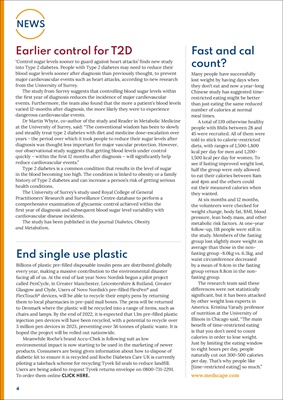
4
NEWS
Earlier control for T2D
'Control sugar levels sooner to guard against heart attacks' finds new study
into Type 2 diabetes. People with Type 2 diabetes may need to reduce their
blood sugar levels sooner after diagnosis than previously thought, to prevent
major cardiovascular events such as heart attacks, according to new research
from the University of Surrey.
The study from Surrey suggests that controlling blood sugar levels within
the first year of diagnosis reduces the incidence of major cardiovascular
events. Furthermore, the team also found that the more a patient's blood levels
varied 12-months after diagnosis, the more likely they were to experience
dangerous cardiovascular events.
Dr Martin Whyte, co-author of the study and Reader in Metabolic Medicine
at the University of Surrey, said: "The conventional wisdom has been to slowly
and steadily treat type 2 diabetes with diet and medicine dose-escalation over
years - the period over which it took people to reduce their sugar levels after
diagnosis was thought less important for major vascular protection. However,
our observational study suggests that getting blood levels under control
quickly - within the first 12 months after diagnosis - will significantly help
reduce cardiovascular events."
Type 2 diabetes is a common condition that results in the level of sugar
in the blood becoming too high. The condition is linked to obesity or a family
history of Type 2 diabetes and can increase a person's risk of getting serious
health conditions.
The University of Surrey's study used Royal College of General
Practitioners' Research and Surveillance Centre database to perform a
comprehensive examination of glycaemic control achieved within the
first year of diagnosis and subsequent blood sugar level variability with
cardiovascular disease incidents.
The study has been published in the journal Diabetes, Obesity
and Metabolism.
End single use plastic
Billions of plastic pre-filled disposable insulin pens are distributed globally
every year, making a massive contribution to the environmental disaster
facing all of us. At the end of last year Novo Nordisk began a pilot project
called PenCycle, in Greater Manchester, Leicestershire & Rutland, Greater
Glasgow and Clyde, Users of Novo Nordisk's pre-filled FlexPen® and
FlexTouch® devices, will be able to recycle their empty pens by returning
them to local pharmacies in pre-paid mail boxes. The pens will be returned
to Denmark where the plastic will be recycled into a range of items, such as
chairs and lamps. By the end of 2022, it is expected that 1.1m pre-filled plastic
injection pen devices will have been recycled, with a potential to recycle over
3 million pen devices in 2023, preventing over 56 tonnes of plastic waste. It is
hoped the project will be rolled out nationwide.
Meanwhile Roche's brand Accu-Chek is following suit as low
environmental impact is now starting to be used in the marketing of newer
products. Consumers are being given information about how to dispose of
diabetic kit to ensure it is recycled and Roche Diabetes Care UK is currently
piloting a takeback scheme for recycling Tyvek lid seals to reduce landfill.
Users are being asked to request Tyvek returns envelope on 0800-731-2291.
To order them online CLICK HERE.
Fast and cal
count?
Many people have successfully
lost weight by having days when
they don't eat and now a year-long
Chinese study has suggested timerestricted
eating might be better
than just eating the same reduced
number of calories at normal
meal times.
A total of 139 otherwise healthy
people with BMIs between 28 and
45 were recruited. All of them were
told to stick to calorie-restricted
diets, with ranges of 1,500-1,800
kcal per day for men and 1,200-
1,500 kcal per day for women. To
see if fasting improved weight lost,
half the group were only allowed
to eat their calories between 8am
and 4pm and the others could
eat their measured calories when
they wanted.
At six months and 12 months,
the volunteers were checked for
weight change, body fat, BMI, blood
pressure, lean body mass, and other
metabolic risk factors. At one-year
follow-up, 118 people were still in
the study. Members of the fasting
group lost slightly more weight on
average than those in the nonfasting group
-8.0kg vs. 6.3kg, and
waist circumference decreased
by a mean of 9.4cm in the fasting
group versus 8.8cm in the nonfasting group.
The research team said these
differences were not statistically
significant, but it has been attacked
by other weight loss experts in
America. Kristina Varady professor
of nutrition at the University of
Illinois in Chicago said, "The main
benefit of time-restricted eating
is that you don't need to count
calories in order to lose weight.
Just by limiting the eating window
to eight hours per day, people
naturally cut out 300-500 calories
per day. That's why people like
[time-restricted eating] so much."
www.medscape.com